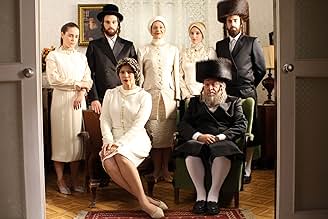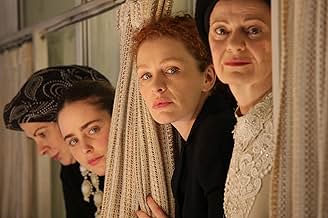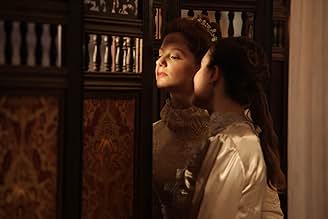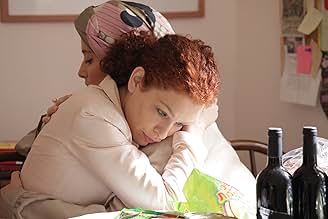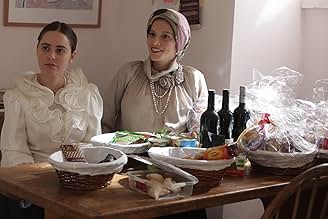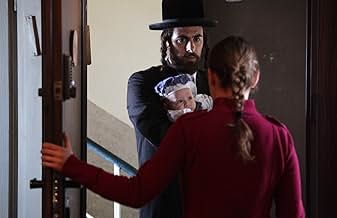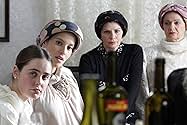When the older sister of Shira, an 18-year-old Hasidic Israeli, dies suddenly in childbirth, Shira must decide if she can and should marry her widowed brother-in-law, which also generates te... Read allWhen the older sister of Shira, an 18-year-old Hasidic Israeli, dies suddenly in childbirth, Shira must decide if she can and should marry her widowed brother-in-law, which also generates tensions within her extended family.When the older sister of Shira, an 18-year-old Hasidic Israeli, dies suddenly in childbirth, Shira must decide if she can and should marry her widowed brother-in-law, which also generates tensions within her extended family.
- Awards
- 14 wins & 16 nominations total
- Director
- Writer
- All cast & crew
- Production, box office & more at IMDbPro
Featured reviews
Israel's official entry to the Oscars this year is probably too minimalistic and low-key to make it to the final five, but it's a film well worth watching and is in fact one of the best films I've seen so far emerge from the growing Israeli cinema. Fill the Void is of particular interest to Israeli viewers because it's a rare window into the very closed-community lifestyle of the Orthodox Jews, giving very rare insight as the film was made by an Orthodox director but with a secular audience in mind, which is something never seen before. For foreign viewers too, it may be a fascinating glimpse into an anachronistic, static religious community that hardly ever opens itself up like this to the general public.
Cinematically, Fill the Void is startlingly minimalistic; the story is a very brief glimpse into a very simple lifestyle. The gorgeous cinematography compliments that, constantly focusing on the contrast between Hadas Yaron's white face, the black clothing and the gray-brown backgrounds, but with a soft focus that makes it very easy to get lost inside. The cinematography itself is so aesthetic that it often conceals just how simple the story and the characters are - the film revolves around one moral question without giving too much insight into the thought processes of any of the characters. Its real achievement however is in enabling the viewer to be immersed in the environment and the lifestyle of a culture so different from what we're used to, and in that sense it's a triumph.
Cinematically, Fill the Void is startlingly minimalistic; the story is a very brief glimpse into a very simple lifestyle. The gorgeous cinematography compliments that, constantly focusing on the contrast between Hadas Yaron's white face, the black clothing and the gray-brown backgrounds, but with a soft focus that makes it very easy to get lost inside. The cinematography itself is so aesthetic that it often conceals just how simple the story and the characters are - the film revolves around one moral question without giving too much insight into the thought processes of any of the characters. Its real achievement however is in enabling the viewer to be immersed in the environment and the lifestyle of a culture so different from what we're used to, and in that sense it's a triumph.
Gets _way_ further inside the world of the "Orthodox Jew" than anything I've ever even heard about before. The director and some of the actors really are Orthodox, so the portrayals of both home life and ceremonies that are seldom photographed are truly accurate, not just informed guesses. Yet this is not an "ethnographic record", it's a feature film. And the cinematography is excellent, about as far from an "amateur home movie" as you could possibly get.
The glass-half-full description is "a character study" - the glass-half-empty description is "slow boiler". Those prone to getting fidgety will probably be tested beyond their endurance. The psychological nuances aren't trivial - this film is the official submission of Israel to the Best Foreign Language Film for the Academy Awards.
The treatment of women looks "old-fashioned" to us: separate rooms, hair covering, emergency health care workers restricted if they might see something they normally wouldn't ...all the horror stories we've heard. This deeper look though shows us the considerable adaptation and flexibility around those rules-- architecture modified so those separate rooms aren't all that separate, a spinster covering her hair on the advice of her rebbe even though she'd never been married so people wouldn't ask so many awkward questions, the wife controlling the money in a rebbe's household, arranging clandestine peeks at potential mates via cellphone. The clumps of women standing in doorways reminded me powerfully of the clumps of servants in those Manor House period piece films like Gosford Park. The blocking of access to females in physical distress reminds me of stories out of Saudi Arabia. And the photo I saw later of a "fashion designer" Muslim hair covering looked so much like what these Orthodox women wear I did a double-take.
No easy answers, no "good guys" and "bad guys". There are both pros and cons. Downsides include difficulty finding a marriage partner, great difficulty keeping widows and widowers within the community, birth defects apparently from genetic inbreeding, and almost complete loss of input into the direction of the surrounding society/economy. Upsides include very strong support from both family and friends, and unparalleled community closeness. Where else do non-relatives easily call other adults by their pet names when the going gets rough? And how often do family friends feel free to proffer a word of contrary advice at any time? And although someone's decision to move away is often somewhat painful to others, where else would people literally rather die?
Beforehand I was ready to keep my distance and laugh at "those silly people". But watching it I realized the film applies equally well to _all_ communities that are "in the world but not of the world": fundamentalist Christians; even hippies who've resigned themselves to having zero political influence. There's a whole lot of space in the middle on the line with "modern society" on one end and "a cult" on the other end. Although on the surface this film is about a particular world that's about as familiar to me as living on Mars, the deeper story of gaining community but losing interaction with the surrounding society/economy still has me ruminating days later.
The glass-half-full description is "a character study" - the glass-half-empty description is "slow boiler". Those prone to getting fidgety will probably be tested beyond their endurance. The psychological nuances aren't trivial - this film is the official submission of Israel to the Best Foreign Language Film for the Academy Awards.
The treatment of women looks "old-fashioned" to us: separate rooms, hair covering, emergency health care workers restricted if they might see something they normally wouldn't ...all the horror stories we've heard. This deeper look though shows us the considerable adaptation and flexibility around those rules-- architecture modified so those separate rooms aren't all that separate, a spinster covering her hair on the advice of her rebbe even though she'd never been married so people wouldn't ask so many awkward questions, the wife controlling the money in a rebbe's household, arranging clandestine peeks at potential mates via cellphone. The clumps of women standing in doorways reminded me powerfully of the clumps of servants in those Manor House period piece films like Gosford Park. The blocking of access to females in physical distress reminds me of stories out of Saudi Arabia. And the photo I saw later of a "fashion designer" Muslim hair covering looked so much like what these Orthodox women wear I did a double-take.
No easy answers, no "good guys" and "bad guys". There are both pros and cons. Downsides include difficulty finding a marriage partner, great difficulty keeping widows and widowers within the community, birth defects apparently from genetic inbreeding, and almost complete loss of input into the direction of the surrounding society/economy. Upsides include very strong support from both family and friends, and unparalleled community closeness. Where else do non-relatives easily call other adults by their pet names when the going gets rough? And how often do family friends feel free to proffer a word of contrary advice at any time? And although someone's decision to move away is often somewhat painful to others, where else would people literally rather die?
Beforehand I was ready to keep my distance and laugh at "those silly people". But watching it I realized the film applies equally well to _all_ communities that are "in the world but not of the world": fundamentalist Christians; even hippies who've resigned themselves to having zero political influence. There's a whole lot of space in the middle on the line with "modern society" on one end and "a cult" on the other end. Although on the surface this film is about a particular world that's about as familiar to me as living on Mars, the deeper story of gaining community but losing interaction with the surrounding society/economy still has me ruminating days later.
Put aside what you think you know or don't know about the inner world of an orthodox Chassidic community in Tel Aviv, and let Rama Burshtein weave a story that is believable, engrossing, and rich with nuance and subtlety... the timeless themes found in a community which lives in the past, the excellent acting, direction and casting, will have you quickly absorbed in this terrific film.
If you are looking to vent your critique or holier than thou judgments of Jewish Orthodoxy, you may feel a bit humbled by the humanity found behind the long dresses, black robes and covered heads. The portrayal of the rabbi is an especially tender reflection of some one who is indeed spiritual, in the most human sense.
If you are looking to vent your critique or holier than thou judgments of Jewish Orthodoxy, you may feel a bit humbled by the humanity found behind the long dresses, black robes and covered heads. The portrayal of the rabbi is an especially tender reflection of some one who is indeed spiritual, in the most human sense.
Over the last dozen or so years, no less than seven films have been made about the orthodox religious community in Israel. These films are:
Forbidden Love (1999); Kadosh (1999); Bat Kol (Inner Voice) (2002); Ushpizin (2004); My Father, My Lord (2007); The Secrets (2007); Eyes Wide Open (2009).
All these films were made by non-religious or at least non-orthodox film makers, and then along came Fill the Void. Its director and scriptwriter, Rama Burshtein, is an orthodox woman who is also a film maker.
Which raises the question whether this new film is more authentic than the previous ones, whether it portrays the orthodox community more faithfully. It should be understood that the orthodox communities in Israel are tightly-knit units, abhorring the outside, modern Western way of life which they perceive as decadent, immoral and corruptive. They still dress as did their ancestors in the Shtetl in Eastern Europe centuries ago, talk mostly Yiddish among themselves and of course, inter-marry only within their milieu.
Fill the Void is indeed about this latter issue, the question of marriage. The questions raised by the protagonists may seem quaint and even amusing to us, but seem of paramount importance to them, as if no other issues occupy their closed life.
This reviewer has no way of assessing the veracity of the facts and can only rely on subjective impressions. The film "rings true", feels true, and the fact that some of the actors come from a religious background adds to the feeling. Viewers might sneer at the seemingly irrelevant questions facing those "strange" people, but the acting convincingly conveys the sentiment that we are indeed dealing with a grave situation.
I came out of the theater thinking not about the heroine, blandly played by Hila Feldman, or about the way she handles her private demons and dilemmas, but about the strange, foreign, incomprehensible community living not a mile away from my house in the same city, yet separated from me by an unbridgeable chasm.
A disturbing movie.
Forbidden Love (1999); Kadosh (1999); Bat Kol (Inner Voice) (2002); Ushpizin (2004); My Father, My Lord (2007); The Secrets (2007); Eyes Wide Open (2009).
All these films were made by non-religious or at least non-orthodox film makers, and then along came Fill the Void. Its director and scriptwriter, Rama Burshtein, is an orthodox woman who is also a film maker.
Which raises the question whether this new film is more authentic than the previous ones, whether it portrays the orthodox community more faithfully. It should be understood that the orthodox communities in Israel are tightly-knit units, abhorring the outside, modern Western way of life which they perceive as decadent, immoral and corruptive. They still dress as did their ancestors in the Shtetl in Eastern Europe centuries ago, talk mostly Yiddish among themselves and of course, inter-marry only within their milieu.
Fill the Void is indeed about this latter issue, the question of marriage. The questions raised by the protagonists may seem quaint and even amusing to us, but seem of paramount importance to them, as if no other issues occupy their closed life.
This reviewer has no way of assessing the veracity of the facts and can only rely on subjective impressions. The film "rings true", feels true, and the fact that some of the actors come from a religious background adds to the feeling. Viewers might sneer at the seemingly irrelevant questions facing those "strange" people, but the acting convincingly conveys the sentiment that we are indeed dealing with a grave situation.
I came out of the theater thinking not about the heroine, blandly played by Hila Feldman, or about the way she handles her private demons and dilemmas, but about the strange, foreign, incomprehensible community living not a mile away from my house in the same city, yet separated from me by an unbridgeable chasm.
A disturbing movie.
10Red-125
The Israeli film Lemale et ha'halal was shown in the United States with the title "Fill the Void" (2012). It was written and directed by Rama Burshtein. Other films exist about highly observant Jews, both in Israel and the U.S. However, this movie is unusual because the director herself if part of the orthodox community. She knows how people act, what they say, how they celebrate, and how they mourn.
As in many communities where a woman's outside options are limited, marriage is a central and crucial moment in their lives. Matches are arranged, but the woman always has the right to turn down a prospective suitor. Even so, the decision about whom to marry is critically important.
The wonderful young Israeli actor Hadas Yaron plays Shira, whose time for marriage has come. A match has been made, and Shira is excited about meeting the young man and, presumably, falling in love with him. Then tragedy strikes. Shira's loving older sister dies in childbirth, leaving behind a baby boy and a widower. In order to keep the family together, it is suggested that Shira marry the baby's father. He appears to be a fine man, but he's older than she is. Also, as Shira points out, she had dreams of exploring marriage with a young man, not with a previously-married man who has a child.
It would have been easy for the director to craft a story where the whole community is pushing Shira to marry Yochay, her late sister's widower. That's not how the film was crafted. Everyone respects Shira's right to decide, and Yochay isn't desperate, either. A match has been made for him with a woman from Belgium. (The problem is that he'd have to move to Belgium to be with her, and, of course, he'd take his infant son with him.)
You'll have to see the film to find out what happens next. However, the movie is far more than just a vehicle for a plot. It's an intimate look into the lives of the ultra-orthodox, and into the heart and mind of a young woman who wants to do what is right, but also what is best.
Fill the Void won six Israeli Academy Awards, including Best Actress, Best Director, and Best Film. Hadas Yaron won the Best Actress award at the 2012 Venice Film Festival.
We saw this film at Rochester's Dryden Theatre as part of the exceptional Rochester Jewish Film Festival. I think it will work better on a large screen than on DVD, but it's worth searching for it and seeing it on a small screen if necessary. For reasons I can't understand, this movie has a lukewarm IMDb rating of 6.6. Why? It's a brilliant film and deserves to be seen. Ignore the low rating, and don't miss "Fill the Void."
As in many communities where a woman's outside options are limited, marriage is a central and crucial moment in their lives. Matches are arranged, but the woman always has the right to turn down a prospective suitor. Even so, the decision about whom to marry is critically important.
The wonderful young Israeli actor Hadas Yaron plays Shira, whose time for marriage has come. A match has been made, and Shira is excited about meeting the young man and, presumably, falling in love with him. Then tragedy strikes. Shira's loving older sister dies in childbirth, leaving behind a baby boy and a widower. In order to keep the family together, it is suggested that Shira marry the baby's father. He appears to be a fine man, but he's older than she is. Also, as Shira points out, she had dreams of exploring marriage with a young man, not with a previously-married man who has a child.
It would have been easy for the director to craft a story where the whole community is pushing Shira to marry Yochay, her late sister's widower. That's not how the film was crafted. Everyone respects Shira's right to decide, and Yochay isn't desperate, either. A match has been made for him with a woman from Belgium. (The problem is that he'd have to move to Belgium to be with her, and, of course, he'd take his infant son with him.)
You'll have to see the film to find out what happens next. However, the movie is far more than just a vehicle for a plot. It's an intimate look into the lives of the ultra-orthodox, and into the heart and mind of a young woman who wants to do what is right, but also what is best.
Fill the Void won six Israeli Academy Awards, including Best Actress, Best Director, and Best Film. Hadas Yaron won the Best Actress award at the 2012 Venice Film Festival.
We saw this film at Rochester's Dryden Theatre as part of the exceptional Rochester Jewish Film Festival. I think it will work better on a large screen than on DVD, but it's worth searching for it and seeing it on a small screen if necessary. For reasons I can't understand, this movie has a lukewarm IMDb rating of 6.6. Why? It's a brilliant film and deserves to be seen. Ignore the low rating, and don't miss "Fill the Void."
Did you know
- TriviaHadas Yaron had to lie to get out of her military duty to audition for the film.
- ConnectionsFeatured in At the Movies: Venice Film Festival 2012 (2012)
- SoundtracksIm Eshkachech Yerushalayim
(uncredited)
- How long is Fill the Void?Powered by Alexa
Details
Box office
- Gross US & Canada
- $1,775,316
- Opening weekend US & Canada
- $59,164
- May 26, 2013
- Gross worldwide
- $3,197,615
- Runtime1 hour 30 minutes
- Color
- Sound mix
- Aspect ratio
- 2.35 : 1
Contribute to this page
Suggest an edit or add missing content







